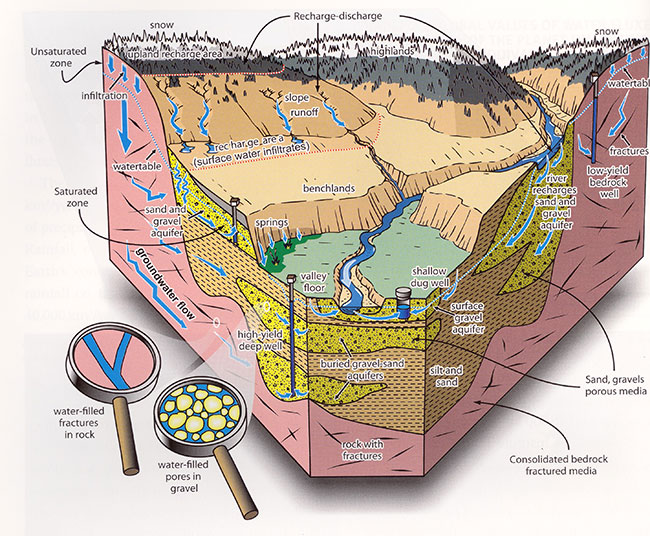
Features
Education
Research
Book Tackles Big Topic
Canada’s Groundwater Resources, a new reference book combines input from more than 50 contributors
April 28, 2015 By Ken Hugo
Water well drillers are involved in the development, protection and production of Canada’s ground water resources, providing a water supply for up to 30 per cent of Canada’s population.
Water well drillers are involved in the development, protection and production of Canada’s ground water resources, providing a water supply for up to 30 per cent of Canada’s population.
 |
|
| Most of the book’s contributors work within universities or government research institutes. Photo courtesy Fitzhenry & Whiteside Advertisement
|
Despite this reliance on this precious natural resource by the citizens of Canada, ground water is often referred to as an unknown resource and the poorer second cousin to surface water sources.
The recently released book, Canada’s Groundwater Resources, is a lavishly illustrated 800-page book meant to dispel this impression and bring together knowledge of Canada’s ground water resources into one volume.
The book is a combination of ground water concepts applicable anywhere in the world and an illustration of ground water conditions in various regions of Canada.
BOOK BREAKS DOWN BROAD TOPIC
To tackle such a large and diverse topic, compiler and editor Alfonso Rivera, who is chief hydrogeologist for the Geological Survey of Canada, has brought together input from more than 50 contributors.
 |
|
| The illustrations and photographs alone make this a worthwhile read on a casual basis. Illustration courtesy Fitzhenry & Whiteside
|
Most of these contributors work within universities or government research institutes such as the Geological Survey of Canada, and their particular backgrounds are evident, with a strong emphasis on an academic approach to the subject.
Split into five parts to make this broad topic easier to examine and digest, the book provides a broad overview of where ground water is found, how it interacts with surface water and what risks it faces.
The first three sections deal with understanding ground water from a conceptual point of view, covering concepts such as recharge and discharge, effect of climate, ground water flow and vulnerability of ground water. These sections provide an overview of ground water concepts that illustrate the nature of the resource.
The fourth section and heart of the book, accounting for more than half the pages, describes the various regions of Canada with respect to their ground water resources. Rivera provides information on types of aquifers, ground water quality, climate, topography, interaction with surface water, and vulnerability of the resource within the region. Ground water regions do not follow political boundaries, so the Prairies are discussed as a geographical region (not as separate provinces), as are ground water resources on the Canadian Shield.
VALUE TO WELL DRILLERS
So would this book be of interest to water well drillers? It would not become a reference book like the Johnson editions of Groundwater and Wells. A driller already familiar with his or her area, would probably would consider his or her knowledge more detailed than the information provided in the book.
However, if a driller was working in a different area of Canada, or a new employee was brought into the firm, then the overview provided in the book would be of value in describing the general nature of aquifers from which the driller might be obtaining water. The concepts presented in the first three chapters would be of value should one need to explain or illustrate ground water concepts, for example, the concept of ground water being found in pore space of rocks and not underground rivers.
Certainly the illustrations and photographs alone are impressive and make the book a worthwhile read on a casual basis.
Canada’s Groundwater Resources is available from Amazon’s Canadian website currently for $94.50, although the list price is $150, and is also available from the publisher, Fitzhenry & Whiteside.
Ken Hugo is a technical director and hyrdogeologist with Groundwater Information Technologies (GRIT).
Print this page